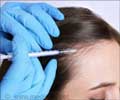Treatment
A couple of centuries ago, men in England were advised to rub chicken dung on their heads to stimulate hair growth. We’ve come a long way since then. Dermatologists (skin doctors) and endocrinologists (hormones doctor) treat hair loss and trichologists specialize in treating baldness. There are medicines, special combs, and surgery to treat hair loss.
The first line of treatment for premature hair loss is to help you hold on to the hair you do have: typically, a doctor will check if you have lifestyle factors or habits that result in hair fall. Then he/she may prescribe drugs to block the formation of DTH and stop follicles from shrinking, and to deliver more blood and more nutrients to hair. After that come surgery and then other hair replacement options. In a nutshell:
- First stop hair fall
- Try proven home treatments
- Drugs for hair fall
- Hair replacement surgery
First stop hair fall
If you habitually pull out your hair, stop doing it. Change your hairstyle if you always wear your hair pulled tight. If you like to iron, perm, or curl your hair, give your hair a (long) break. Even though these treatments will not damage healthy hair on most people, if hair loss is becoming a serious problem, it’s a good idea to go easy and avoid “damaging” hair styles.
A doctor will also advise you to have a protein-, iron-, and calcium-rich diet. For non-vegetarians, this means more animal proteins from eggs, milk, fish, and meat, particularly red meat. In moderation, all these as part of a healthy balanced diet help men and women with diffused thinning. For vegetarians, supplementation may become necessary. Iron deficiency, more common among vegetarians and among women of childbearing age, can cause hair fall.
Also, some tender loving care for yourself and for your hair will do no harm and may do lots of good. Eat a good diet and get enough exercise and sleep. Take care of your teeth also, because some research, as mentioned earlier, has linked patchy hair loss with tooth infections. Use a good quality shampoo and conditioner, keep your hair clean, use salt- and chlorine-free water to wash your hair, don’t towel roughly, let your hair air-dry, and use a comb with rounded teeth regularly to stimulate circulation.
Home treatments
There are lots of traditional home treatments for healthy hair, and while they may not stop the process of severe hair fall, they can slow it down. They will also make your existing hair look better. Traditional Indian hair beauty treatments use eggs, onion juice, henna, gooseberries, and hibiscus flowers, usually made into a paste to be applied on the scalp and hair.
If you go for commercially sold ‘herbal’ and ‘natural’ applications, remember that few of them are proven or even tested. Generally, something that has been around a long time will be safer than any new product, however ‘revolutionary’ it claims to be. Also, a lot of commercial ‘natural’ products (like Avacor) use drugs like minoxidil which are proven to help hair grow – ‘natural’ is just a marketing word to help them sell.
There are also innumerable other ‘specially developed’ shampoos, conditioners, other applications, and supplements available over the counter for hair fall. You need to remember that while these may be enough for some people, few of them are proven, and if your hair loss is severe, you are better off going to a competent doctor.
Drugs for hair fall
Which brings us to medical treatments for premature balding – it is important to go to a reputable doctor who is experienced in treating hair fall problems. Inquire around, consult doctors, and ask if you can talk to his other patients. A good doctor should have no problems with this, and should also be able to show you before-and-after pictures of other people he has treated for hair loss.
A doctor will first check your general health, especially if your hair is still at the thinning stage. He will look at your scalp to check if you have skin problems that can cause hair loss, and ask about your diet and possible stressors in your life. He may order tests of your thyroid, hemoglobin, and hormone levels.
To address every possible cause, many doctors use a combination of medicines to treat hair loss: iron, zinc, and silica supplements, topical solutions like minoxidil (‘vasodilator’ to increase blood circulation) at various concentrations, azelaic acid (DHT blocking application), and finasteride (another medicine to suppress DHT, taken orally). Low-concentration solutions of minoxidil (2.5%) are available over the counter in the United States, but creams with a concentration of up to 12% are available with a prescription. Finasteride is prescribed only for men and can cause birth defects in male babies if taken by pregnant women.
Alopecia areata, or patchy hair loss, is sometimes treated with steroid injections in the area of hair loss, especially when the patch is small and hair loss is not widespread.
The laser comb (from HairMax) infra red light therapy has also been proved effective for hair loss and approved by the FDA, but you need to check that the model you purchase has been approved. At present, the laser comb has been approved only for men.
Hair replacement surgery
If you are young and losing hair, surgery may not be the best option because you could continue to lose hair after surgery, leaving you with an unnatural top-filled and sides-scanty look. You may also need to conserve the hair you have left for a time when surgery does become an option, rather than ‘waste’ follicles for an early operation that you will almost certainly need to correct in the future.
But if you do consider surgery, go to a doctor experienced in this particular kind of surgery. Remember that the most expensive is not always the best – clinics which regularly do hair replacement surgeries may be able to offer you lower prices than more expensive places with fewer patients that need to charge more to cover costs.
Whatever treatment you choose, remember everything takes time to show effects – for hair regrowth, you will have to wait at least four months and up to a year for visible results. You and your doctor need to be continually checking the progress and adjusting treatment to the results you see (or don’t see).







